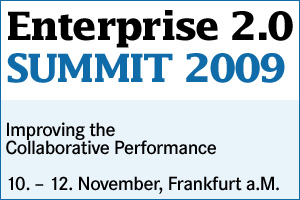 After some good experiences at both the BarCamp Munich and the Enterprise 2.0 Conference in San Francisco it’s probably a good thing to expand the Google Wave experiment onto the upcoming E20SUMMIT. And while we don’t know how many of the attendees have got a Wave ID already, the more geeky ones sure have. And when Joachim Niemeier and I asked on Twitter if we should curate a Wave backchannel to the conference enough people raised their hand. After all there’s more than Twitter for getting more out of conferences – even when it can’t beat the face-to-face experience.
After some good experiences at both the BarCamp Munich and the Enterprise 2.0 Conference in San Francisco it’s probably a good thing to expand the Google Wave experiment onto the upcoming E20SUMMIT. And while we don’t know how many of the attendees have got a Wave ID already, the more geeky ones sure have. And when Joachim Niemeier and I asked on Twitter if we should curate a Wave backchannel to the conference enough people raised their hand. After all there’s more than Twitter for getting more out of conferences – even when it can’t beat the face-to-face experience.
So here’s the idea, we’ve set up a public Google wave which will act as a central repository and catalogue of the various sub-Waves people are free to open (find it by searching for tag:e20swith:public on Wave). And we’ll provide some public “pre-filled” waves too, linked from there. These pre-filled public waves are there to give some framework and structure so that the actual working in the waves during the conference is easier. Much like pre-filling a wiki for sake of better adoption I think …
You are free to add more waves to the catalogue – after all it’s about crowd-sourcing various voices before and after the event. And those individual waves may be both closed to some collaborators or open to everyone, so it’s important to note that once you’ve opened up the wave to everyone (by adding easypublic@appspot.com to the wave) you can’t go back to closed (if there’s a way to accomplish this please let me know).
Moreover I think it’s a good idea to ask presenters if it’s OK to document their presentations in Wave – especially when you’ve opened it up to the world. Much like live-tweeting or -blogging it’s professional decency to respect the speaker’s wishes. Then again, and much alike the “wiki situation” – it’s probably cooler to have open waves for everyone from the beginning.
